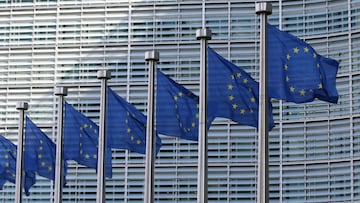Was Ukraine accepted into the EU? How does joining the EU help Ukraine?
Ukrainian president Zelenskyy formally applied for EU membership under a "new special procedure," for a process that normally can take several years.

In an impassioned plea to the European Union, President Volodymyr Zelenskyy of Ukraine formally applied for EU membership. The request comes as the Russian forces bombard Ukrainian cities and a military convoy 40 miles long moves toward Kyiv to decapitate the government.
Ukraine currently has an association agreement with the EU to align its economy and deepen political ties which it signed in 2017. In order for the country to become a full member of the trading block, Ukraine must satisfy a series of economic and political conditions before it could enter into negotiations.
Also see:
Ukraine has been striving to join the EU and NATO for years and doing so was added as an amendment to the nation’s constitution in 2019. By joining the EU, Ukraine must hope that this would secure its borders with Russia. Although many members of the trading bloc are NATO members too, the economic union does not carry a joint military defense component.
Russia’s military aggression has spurred Georgia to move up submitting its membership application by two years. Likewise, Moldova has said it plans to apply for membership in the coming days, most likely prompted by Alexander Lukashenko, the president of Belarus. The close ally of Putin, whose troops have joined Russian forces invading Ukraine, was in front of a battle map that indicated an incursion into Transnistria, Moldova's own breakaway region backed by Moscow.
Joining the European Union can take years to complete
Hours before the Ukrainian leader signed the formal application for accession to the EU, Zelenskyy released a video appealing for Ukraine's immediate entry through a "new special procedure." He didn’t detail what such a procedure would entail but other member states have taken years to finalize the process.
Ukraine would need to meet the ‘Copenhagen criteria’ which involves bringing its national laws into compliance with those of the EU. Any potential member must have a free-mark economy, judiciary system based on the rule of law and a stable democratic political system. After membership a nation must work toward adopting the euro as its currency as well. Currently only 19 of the 27 EU nations are part of the eurozone monetary union.
Once a country submits an application it given to the European Commission which assesses the applicant’s ability to meet the Copenhagen criteria. The assessment itself can take more than a year. After the Commission greenlights the process, all members on the European Council must unanimously vote in favor of beginning the negotiation process.
Speeding up the process is unlikely
Despite earnest efforts to fight corruption Ukraine has its work cut out to meet the accession criteria. In 2021 it was ranked 122 out of 180 countries on Transparency International’s Corruption Perception Index. The second lowest score in Europe after Russia. The Heritage Foundation 2022 Index of Economic Freedom placed Ukraine 44th out of 45 European countries, below Russia but just above Belarus.
Five other nations are currently in the process of accession to the EU. They include Albania, Montenegro, North Macedonia, Serbia and Turkey, which itself has been in negotiations since 2005. Letting Ukraine jump the queue so to speak would be difficult for the EU to explain to those countries which have been working to join the bloc for years.






